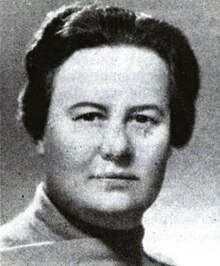Addie Viola Smith | |
|---|---|
 Pictured in 1948 | |
| Consul and secretary to the Consulate General of the United States, Shanghai | |
| In office 1939 – c. 1942 | |
| Trade commissioner in Shanghai, Bureau of Foreign and Domestic Commerce, United States Department of Commerce | |
| In office January 1, 1928 – 1939 | |
| Assistant trade commissioner in Shanghai | |
| In office November 1, 1922 – December 31, 1927 | |
| Personal details | |
| Born | November 14, 1893 Stockton, California, United States |
| Died | December 13, 1975 (aged 82) Mosman, New South Wales, Australia |
| Domestic partner | Eleanor Mary Hinder |
| Education | Bachelor of laws, Washington College of Law, 1920 |
| Occupation | Attorney |
| Profession | Foreign Service officer |
| Known for | First woman Foreign Service officer in the United States Foreign Service to work under the United States Department of Commerce, first woman assistant trade commissioner, trade commissioner in Shanghai |
Addie Viola Smith (November 14, 1893 – December 13, 1975), also known as Shi Fanglan (Chinese: 施芳蘭),[1] was an American attorney who served as the trade commissioner to Shanghai from 1928 to 1949. She was the first woman Foreign Service officer in the United States Foreign Service to work under the United States Department of Commerce and the first woman assistant trade commissioner.
Smith was born and raised in Stockton, California. She attended college in San Francisco and worked for a merchandising company in California from 1910 to 1917. In 1917, she moved to Washington, D.C., to work for the United States Department of Labor. She attended the Washington College of Law part time and earned a bachelor of laws in 1920. In October 1920, Smith joined the Foreign Service. She was assigned to Beijing as a clerk in the trade commissioner's office and promoted to assistant trade commissioner in Shanghai in 1922.
Smith was appointed trade commissioner of Shanghai in 1928. During her tenure, she promoted the importation of American automobiles into China and the introduction of American radio. She held the post until 1939, when she took on the position of consul and secretary to the United States Consulate in Shanghai. Thereafter, Smith served in several roles in the United States government. She was the representative of the International Federation of Women Lawyers to the United Nations from 1952 to 1964. She was also a member of several feminist organizations, including the American Women's Club of Shanghai and the Joint Committee of Shanghai Women's Organizations; scholars have described her international feminist activism as being rooted in imperialist and colonialist attitudes.
Smith met her life partner, Eleanor Mary Hinder, in Shanghai in 1926. They lived together, with periods of separation, until Hinder’s death in 1963. Smith remained close to Hinder's family and chronicled their genealogy. Smith died on December 13, 1975, in Mosman, New South Wales, Australia, and was cremated. Smith and Hinder were memorialized by their friends with two stone seats at the E.G. Waterhouse National Camellia Gardens in Caringbah.
